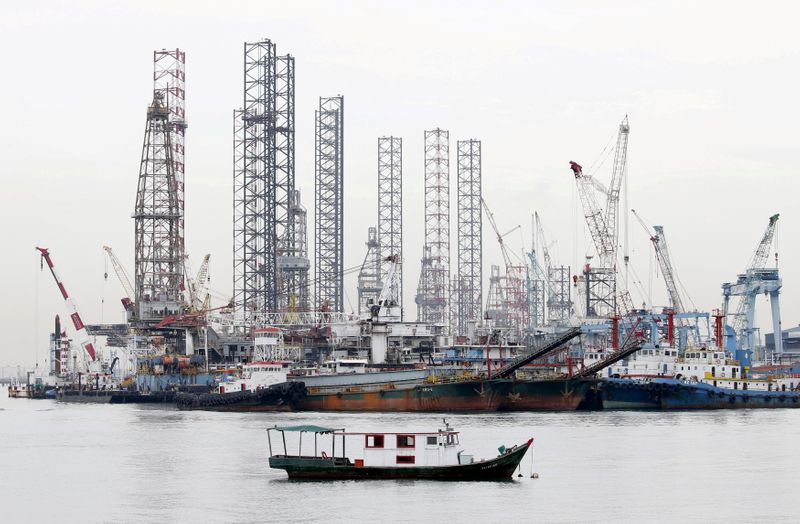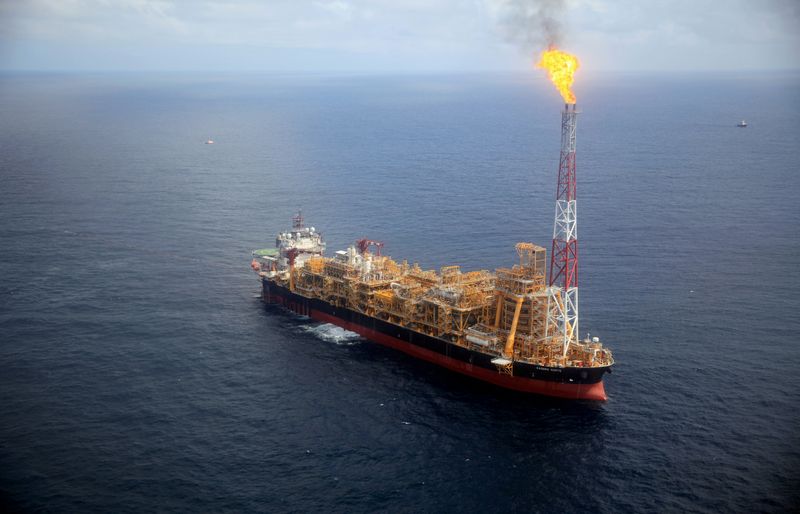By Liz Hampton and Nerijus Adomaitis
DENVER/OSLO (Reuters) - The companies that operate offshore drilling rigs for major oil producers face a second wave of bankruptcies in four years amid a historic drop in energy prices that likely will leave surviving drillers more closely tied to big oil firms.
A collapse of the offshore industry will have broad impact. Drillers and their suppliers have driven innovation that has helped shale and offshore wind companies by pioneering remote monitoring and control, and last year directly generated about 25% of global oil production.
The offshore services business is the worst performing of the oilfield services sector, with shares of the 10 largest publicly traded down 77% since the start of the year.
Four of the seven largest offshore drillers - Diamond Offshore Drilling Inc (NYSE:DO)
Two others are reaching out to their creditors. Pacific Drilling (N:PACD) last month said it may need to modify terms of its debt, and was seeking alternative funding in the event creditors would not accept new terms. Shelf Drilling (OL:SHLF), the ninth largest by revenue, is seeking talks with creditors over loan covenants that take effect next year, executives said.
The latest offshore industry's turmoil "is going to change things in many ways," Odfjell Drilling Chief Executive Simen Lieungh said in an interview. "Existing players and the existing structures will probably not be there as today," he said referring to companies scrapping rigs.
(For a graphic on global drilling rigs, click on: https://fingfx.thomsonreuters.com/gfx/editorcharts/jbyprrjkape/index.html)
EARLY OPTIMISM FADES
The sector had limped along as exploration fell due to high costs and the advent of cheaper U.S. shale. Then, a flurry of giant discoveries off the coasts of South America and Africa rekindled oil majors' interest in deep water projects and led to a boom in offshore leases two years ago.
Drillers began the year predicting a recovery with oil prices (LCOc1) at $60 per barrel. But optimism soured as the pandemic crushed demand and oil prices fell below $20 in April.
This month, the number of floating rigs at work is expected to hit the lowest level since 1986 as oil companies cancel or defer contracts, said industry executives and analysts.
The last downturn was cushioned by help from oil producers. Between 2014 and 2016, as crude fell to $26 per barrel from over $100, oil majors spread work among drillers to keep exploring off the coasts of Brazil, Mozambique and in the Mediterranean. That allowed drillers whose rig contracts were canceled to pick up some jobs, albeit at lower lease rates.
The offshore industry was financially stronger then. Many had entered that downturn with large order backlogs and held contracts with lease rates higher than today's, said Jorn Madsen, CEO of Maersk Drilling (CO:DRLCO).
But with oil majors this year slashing their own spending by between 30% and 50% to preserve cash and pay dividends there is no safety net. Winners will be those companies that get debts refinanced and get through the next two years, said industry officials.
Offshore service firms may need to scrap up to 200 of the about 800 existing floating rigs to regain profitable lease rates, said David Carter Shinn, head of analysis for rig brokerage Bassoe Offshore.
There is little hope for a rebound in the next few years. Many oil producers are withdrawing from projects that require $60 per barrel to earn a profit, concluding it could be years before they see that price again. Chevron (N:CVX), Exxon Mobil (N:XOM), Petronas (KL:PETR) and Royal Dutch Shell (L:RDSa) ended drilling contracts early this year to save money.
"Higher cost production in our industry will be shut in and projects will be delayed," said Rick Fowler, chief operating officer at U.S. offshore oil producer LLOG Exploration.
Chevron said it will limit offshore work to fields that connect to existing infrastructure rather than start new exploration. Exxon, BP (L:BP), Total (PA:TOTF) and Shell declined to comment or did not reply to requests for comment on the impact on their drilling plans.
The abrupt halt of exploration has been devastating to drillers. They are writing down billions of dollars on the value of their fleets.
Finding new money will be difficult, said Basil Karampelas, a managing director at SierraConstellation Partners who advises companies on financial restructurings.
Bankruptcy investors evaluate companies on 13-week or 26-week cash flows in making decisions, he said. But for many drillers, there will be little to show. Creditors, he said, "will have to decide if they want to ante up to get past that period."
THE PATH AHEAD
Many of the offshore drillers are scrapping or retiring vessels, having concluded it may be years before they are needed again. Valaris plans to scrap 11 rigs and put aside nine others, estimating it may take two years before they are needed again.
Seadrill, which slipped into bankruptcy in 2017 after the last oil price downturn, pioneered a model for sharing costs that might prove a path forward, said analysts.
It formed joint ventures with customers including a Qatar Petroleum spinoff and Sonangol Group that have survived the last downturn. The joint ventures focused on oil fields that have long lives and gave drillers a way to lower their contract risks.
The Seadrill ventures "have delivered increased fleet utilization and incremental access to markets that are expected to show significant growth over the coming years," Seadrill spokesman Ian Cracknell said.

"It could be one of the few options to move forward," said William Turner, a vice president at Welligence Energy Analytics. "There is not a lot more folks can do to lower costs, especially in deepwater. They are going to have to get creative to survive," he said.
